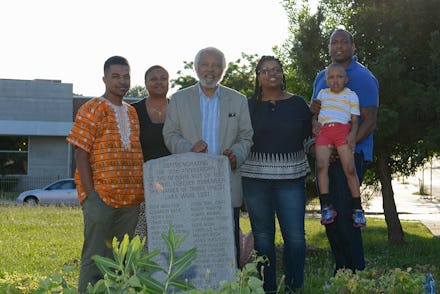After the Newark riots, one family staged a quiet, generations-long rebellion by staying in the city

Junius Williams doesn’t refer to the Newark Riots as riots. He calls those four days in the summer of 1967 “the Rebellion.”
Nearly every “riot” in the history of America that was sparked by an act of police brutality against a marginalized person was actually an act of a rebellion. From Harlem and Watts, to Detroit and Los Angeles, to Ferguson and Baltimore, the days-long uprisings that often occur after African-Americans are harmed by law enforcement have been labeled riots for the very same reason as the acts that prompted people’s resistance: white fear of black bodies.
The Newark Rebellion was no different. A black cab driver named John Smith was profiled by two white police officers, then pursued, stopped and pulled from his car. Smith was badly beaten by the officers and dragged to the Newark precinct. Rumors quickly spread that Smith had been killed, and black Newark residents were sick and tired of being sick and tired.
When they kill us, our sense memory kicks in; we resist and grieve, grieve and resist in a visceral loop as the violence against us continues.
In America, black humanity is a violation. But for Junius Williams, black humanity is an ongoing rebellion, reflected in his life, and the livelihoods and choices of his children.
Williams moved to Newark, New Jersey, in 1965, after graduating from Amherst College, and at the behest of the then-famous civil rights activist Tom Hayden, who died in 2016. The civil rights movement in the South was over, Hayden told Williams, and it was time to focus on the issues facing the North — specifically, in Newark, where racial tensions had reached a fever pitch after years of redlining, police profiling and limited education and job opportunities for African-Americans.
That’s why Williams was there on the evening of July 12, 1967 when the city erupted in violence, leaving 26 dead and hundreds injured. He didn’t go out that first night, but on the second night, he and a few friends wanted to see what was happening to their city. Like clockwork, Williams and his friends almost immediately had a perilous run-in with the police.
But he remains in Newark today, fifty years later. His legacy of resistance and civic pride is embodied by his children — two sets, from two separate marriages, 20 years apart, with yet another generation represented by his 4-year-old grandson — all of whom have chosen to stay in Newark.
Williams is tall and spry with a crown of coarse silver hair and bright, spirited eyes. He grew up in Richmond, Virginia, the son of music educators, and has been many things throughout his life — activist, lawyer, musician, public school advocate and author of the 2014 political memoir, Unfinished Agenda: Urban Politics in the Era of Black Power. But he is also a greathearted elder who flies somewhat below the cultural radar.
Williams and his first wife had two daughters born in the 70s: Junea, who owns a home in the University Heights neighborhood of Newark, and Camille, who lives in nearby Society Hill with their mother. Junea is a trained lawyer who, like her father, chose to use law to help her community and thus works on diversity initiatives at nearby Montclair State University. And, though she could have bought a home anywhere, after watching her father fight the city’s stigma in the aftermath of the rebellion, Junea decided to stay and help her hometown thrive.
Camille, however, talks about Newark as if it were something or someone that deserves both special care and reverence. The city means so many things to her: It’s where her parents fell in love; it’s where her neighbors and coworkers have lost loved ones in the streets; it’s where her younger brothers, and now her young nephew are. And as long as they are in Newark, she will be, too.
Williams has two sons with his current wife: Junius Onome, 21, and Che. Junius Onome is studying Omani trade and investment in East Africa at Harvard University; Che is in his second year at Hampshire College, focusing on film and Africana studies.
All four siblings recognize their privileges — growing up with loving and attentive parents in a middle class family with money for private schools and college and some amount of generational wealth, all while rooted in a strong foundation of black culture and history. Junea talks about “passing the baton” to the next generation of Newark leaders, while Che emphasizes the innovative music that comes out of the city. Camille focuses on making sure the elders in her community always have what they need, and Junius appreciates the safe haven of their family home.
Williams has impressed upon all four of his children that they have the right to live and think and love in the city they call home — a city that has been in turns neglected, under siege and rebuilt. And that they should do so with dignity and pride.
Fifty years ago this coming week in Newark, New Jersey, white America feared a black body and the state law enforcement built to protect that fear went to work. Fear called it a riot. One black family still calls it a rebellion.
WNYC is commemorating the 50th anniversary of the Newark Riots through the narrative lens of the Williams family from July 10 through July 13 on Morning Edition and All Things Considered. The first installment can be heard here, and the second can be heard here.
Correction: July 11, 2017